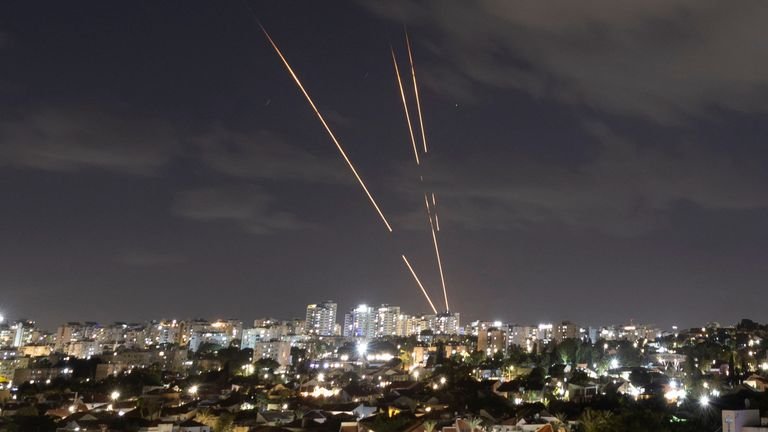In a historic move, G7 leaders have agreed to implement new sanctions on Iran in response to its recent missile attack on Israel, marking a significant escalation in the ongoing Middle East crisis. The decision was made during a high-level meeting convened by Italian Prime Minister Giorgia Meloni, who currently holds the G7 presidency, as tensions between Israel and Iran continue to mount. U.S. President Joe Biden, along with other G7 leaders, unequivocally condemned Iran’s actions, signaling a united front against Tehran’s aggressive stance in the region.
The G7’s decision to impose new sanctions comes as the region inches closer to a full-scale war, with Iran’s missile barrage on Israel marking its largest-ever assault. This retaliatory attack follows Israel’s military campaign against Hezbollah in Lebanon, a group backed by Iran. As the international community watches anxiously, the G7 aims to curtail Iran’s influence in the conflict while promoting regional stability.
Biden’s Strong Condemnation and G7 Unity
The G7 meeting, which focused heavily on the escalating situation in the Middle East, saw leaders express “strong concern” over the potential for a broader conflict. President Biden led the charge in condemning Iran’s missile attack, labeling it as “unacceptable” and “deeply irresponsible.” He also expressed full solidarity with Israel, affirming the United States’ unwavering support for its ally.
The decision to impose new sanctions on Iran represents a coordinated response by the G7, with the leaders agreeing that further punitive measures were necessary to address Tehran’s role in the conflict. “We are determined to hold Iran accountable for its actions,” Biden stated during the meeting, underscoring the G7’s collective resolve. According to a White House statement, the sanctions will target key sectors of Iran’s economy, aiming to limit its military capabilities and funding for Hezbollah.
Middle East on the Edge of War
The G7 leaders’ decision to implement new sanctions on Iran comes at a critical juncture, as the Middle East faces the prospect of a region-wide conflict. Israel and Iran traded sharp warnings at the United Nations Security Council on Wednesday, signaling the gravity of the situation. Israel’s military chief, Herzi Halevi, vowed that Israel would respond to Iran’s missile strike, stating, “We can hit important targets precisely and powerfully.”
The Israeli army has been engaged in intense combat on its northern border with Hezbollah, and the ongoing hostilities have heightened fears that the conflict could spill over into neighboring countries. The G7 leaders, while preparing to implement new sanctions on Iran, also stressed the need for diplomatic efforts to de-escalate tensions. In an official statement, they expressed hope that a diplomatic solution was still possible and emphasized that a wider war would be in no one’s interest.
Sanctions as a Tool to Curb Iran’s Influence
The new sanctions on Iran are expected to have far-reaching consequences, particularly on its military operations and economy. G7 leaders hope that by cutting off critical resources, they can weaken Iran’s ability to support Hezbollah and other militant groups in the region. The sanctions will target key industries, including oil exports, which have long been a vital source of revenue for Tehran’s government.
The G7’s coordinated effort to impose these sanctions also aims to send a clear message that the international community will not tolerate Iran’s continued provocations. President Biden emphasized that while the sanctions are an important step, they are part of a broader strategy to prevent further escalation in the Middle East.
Call for UN Peacekeeping Reinforcements
In addition to discussing sanctions, the G7 leaders also considered bolstering the UN peacekeeping mission along the Israel-Lebanon border. Italian Prime Minister Giorgia Meloni urged the UN Security Council to strengthen the mandate of its UNIFIL peacekeeping force to ensure stability in the region. This move, if approved, could help prevent further cross-border violence between Israel and Hezbollah.
Despite the G7’s push for sanctions and increased peacekeeping efforts, Iranian officials have remained defiant. Iran’s UN Ambassador, Amir Saied Iravani, defended the missile attack, claiming it was a response to Israeli aggression. He warned that further escalation could be avoided if Israel ceased its operations in Gaza and attacks on Lebanon.
A Tense Diplomatic Climate
The G7’s decision to implement new sanctions on Iran reflects the growing sense of urgency among world leaders. While the sanctions are designed to pressure Tehran into halting its military actions, the international community remains on edge as the situation develops. Iran has threatened further retaliatory measures if it perceives continued aggression from Israel or its allies.
British Prime Minister Keir Starmer added to the chorus of support for Israel, stating that the country has “the right to defend itself” in the face of Iranian attacks. However, leaders like President Biden have been cautious in their approach, seeking to avoid a full-scale war in the region.
Conclusion
As the G7 leaders move to implement new sanctions on Iran, the Middle East teeters on the brink of wider conflict. With Iran and Israel both standing firm, the coming days will be crucial in determining whether diplomacy can prevent further escalation. While sanctions are a key tool in the G7’s strategy, much will depend on the willingness of both sides to step back from the precipice of war.
Stay connected to know more on arcnews.online for global news like G7 Leaders To Implement News Sanctions On Iran. For videos updates visit our YouTube. Do subscribe to Arcnews to get latest updates directly in your mail box.
Have A Great Day.


